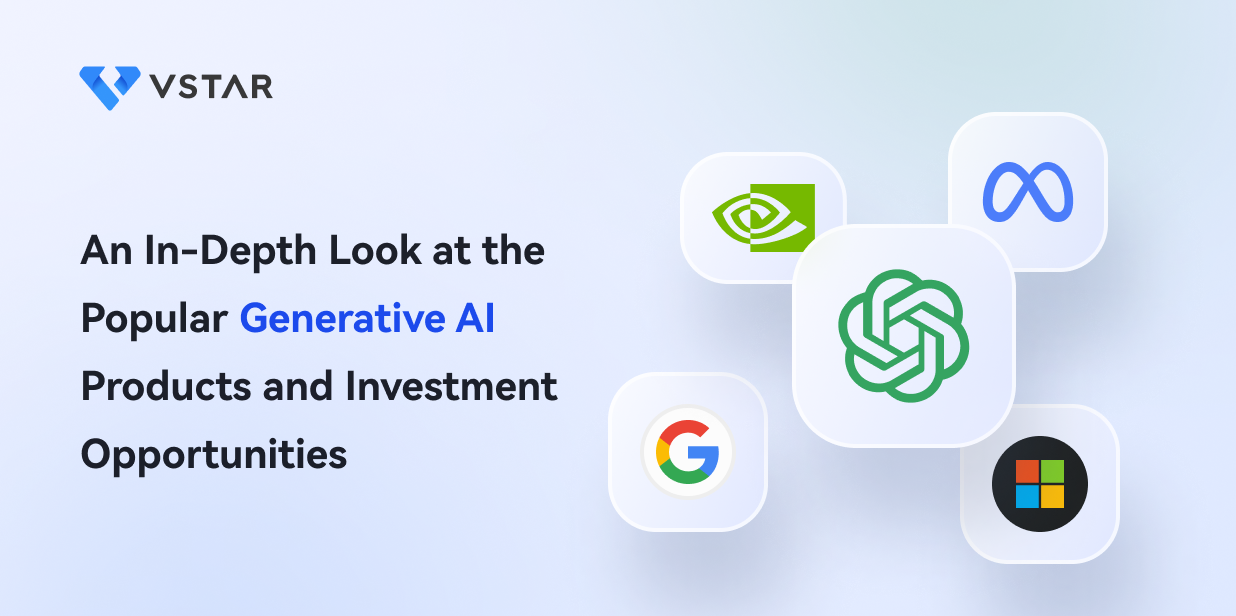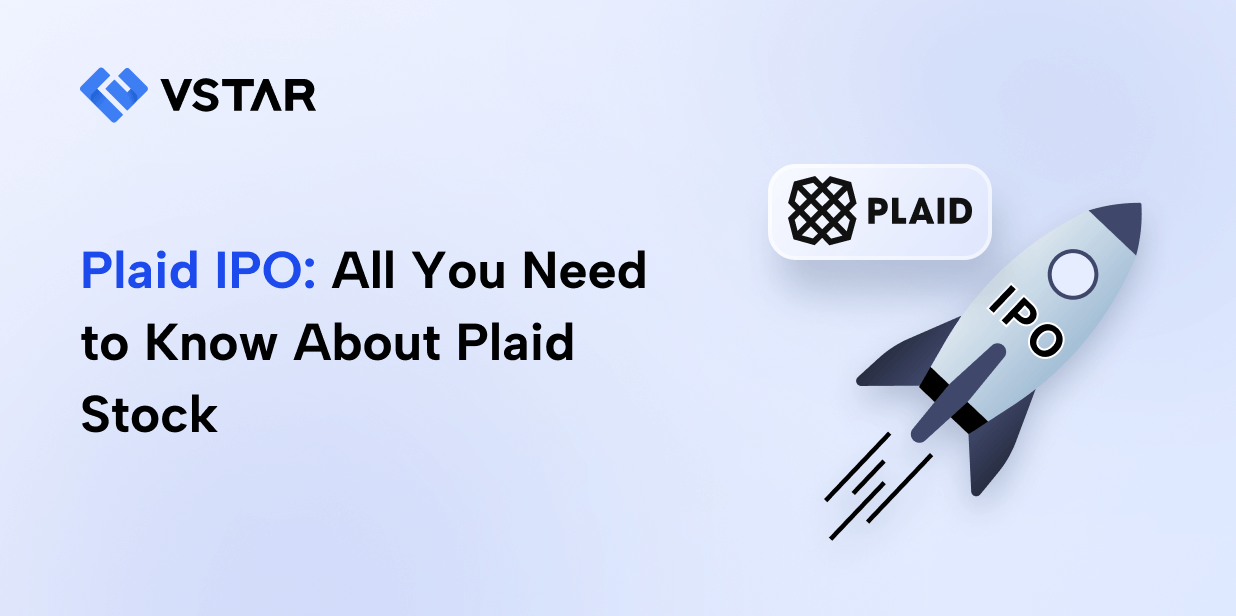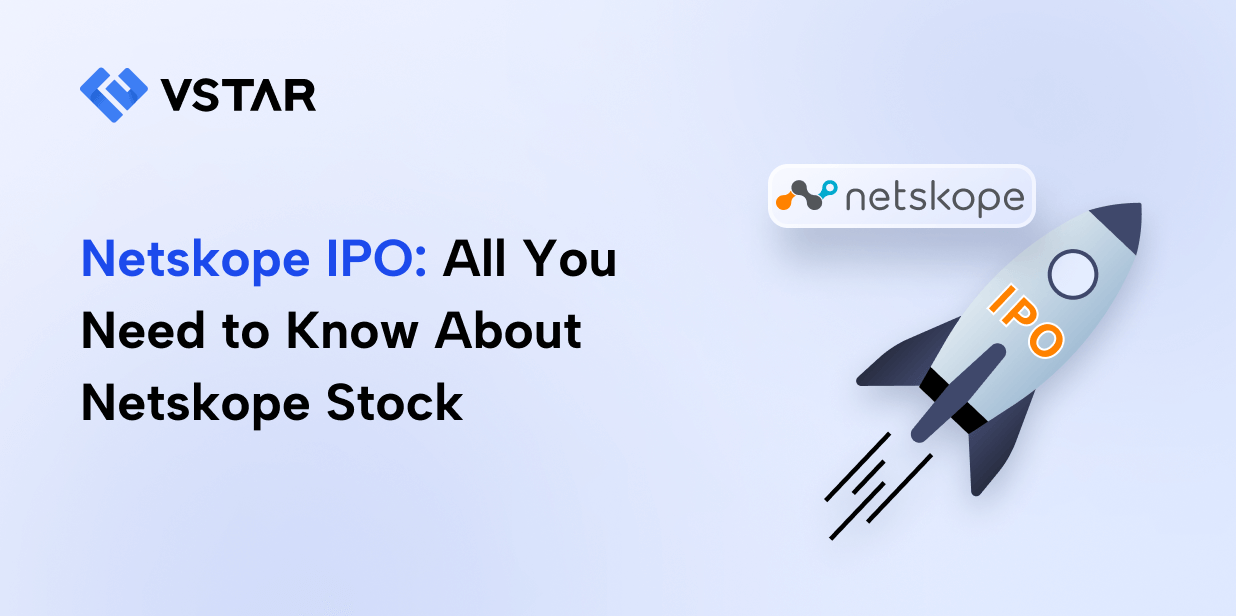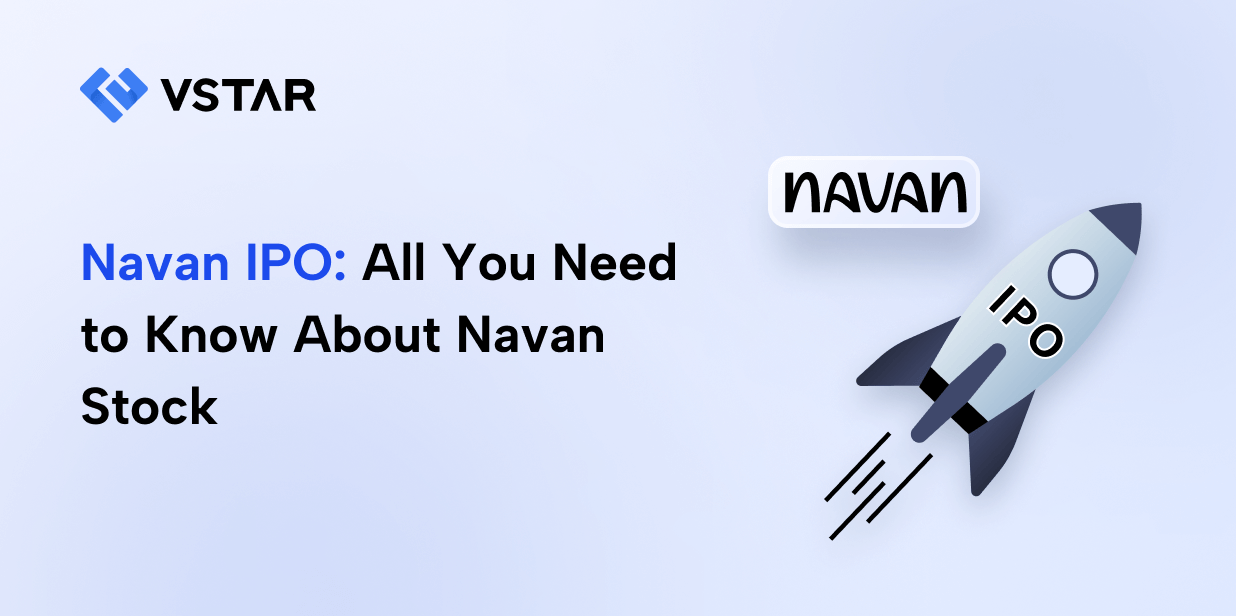Generative AI is a branch of artificial intelligence that can create new content from existing data, such as text, images, music, and video. Generative AI models can learn from large amounts of data and generate realistic and novel outputs that can get used for various purposes, such as entertainment, education, research, and business.
AI stocks are the shares of companies that develop, produce, or use artificial intelligence technologies in their products or services. According to Grand View Research, AI stocks are important for investors who want to benefit from the high growth potential of the AI industry, which should reach $407 billion by 2027.
This article will look at some of the most popular generative AI products and the best AI stocks to invest in. We will focus on five leading AI companies: OpenAI, Microsoft, NVIDIA, Meta (formerly Facebook), and Google. We will also show you how product updates affect stock prices and create investment opportunities for traders who want to profit from market fluctuations.
OpenAI
OpenAI is a research organization that aims to create and promote artificial intelligence that can benefit humanity without profit or power constraints. Prominent tech entrepreneurs and investors like Elon Musk, Peter Thiel, and Reid Hoffman founded the company in 2015. In 2019, OpenAI partnered with Microsoft Corporation, which invested $1 billion in the organization and provided access to its Azure cloud computing platform.
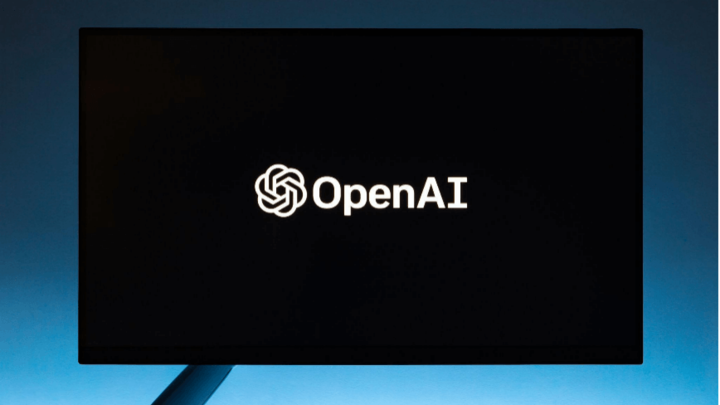
OpenAI is common for developing some of the world's most advanced generative AI models and products. Here are some of them:
● ChatGPT: This is a series of large-scale neural network models that can generate natural language texts based on a given input or context. The latest version, ChatGPT-4, has 175 billion parameters and can produce coherent and diverse texts on various topics and styles.
● DALL-E: This neural network model can generate realistic images from text descriptions. For example, it can create an image of "a cat wearing a suit and tie" or "a snail made of a harp."
● CLIP: This neural network model can learn from any natural language supervision. It can perform various tasks, such as image classification, object detection, and captioning, by using text labels or descriptions as inputs.
● BigGAN: This generative adversarial network (GAN) model can produce high-resolution and diverse images of natural scenes and objects. It can also generate images conditioned on class labels or latent vectors.
● GLIDE: This large-scale generative language model can produce natural language texts for various domains and tasks. It has 1.8 trillion parameters and can generate texts up to 10,000 tokens long.
● Jukebox: This neural network model can generate music with coherent lyrics and vocals. It can also create music in different genres, styles, and moods.
● MuseNet: This neural network model can generate music with multiple instruments and styles. It can also create music based on a genre, artist, or mood.
● Codex: This neural network model can generate computer code from natural language descriptions or examples. It can also answer programming questions and complete code snippets.
Microsoft Corporation (MSFT)
Microsoft Corporation is an American multinational technology corporation headquartered in Redmond, Washington. It is one of the leading companies in generative AI, offering various products and services that leverage AI to create text, images, video, and code. Microsoft also partners with OpenAI discussed above. Some of Microsoft's main generative AI models and products are:

● Azure Machine Learning: a cloud-based platform that enables developers and data scientists to build, deploy, and manage machine learning models at scale.
● Megatron-Turing Natural Language Generation model (MT-NLG): a large-scale language model that can generate natural language texts on various topics and tasks.
● Avatar Framework: a framework that allows users to create realistic and expressive avatars using generative adversarial networks (GANs).
● GODIVA: a video synthesis system that can generate high-quality videos of human actions from text descriptions.
● NUWA: a code generation system that can generate executable code from natural language specifications.
Microsoft Stock (MSFT) Trading Information
Microsoft Corporation is on the NASDAQ stock exchange under the MSFT ticker. The currency of the stock is US dollars (USD). The regular trading hours are from 9:30 a.m. to 4:00 p.m. Eastern Time (ET), Monday to Friday. The pre-market trading hours are from 4:00 a.m. to 9:30 a.m. ET and the after-market trading hours are from 4:00 p.m. to 8:00 p.m. ET.
Microsoft Corporation got founded in 1975 and went public in 1986. Since then, it has issued nine stock splits, the last being a 2-for-1 split in 2003. Microsoft also pays quarterly dividends to its shareholders, the most recent being $0.62 per share in March 2021.
Some of the latest developments that investors and traders should note are:
● In January 2022, Microsoft announced its acquisition of Activision Blizzard, a leading video game company, for $68.7 billion. However, the acquisition was blocked by Britain in April 2023 over competition and consumer concerns.
● Microsoft’s stock rose after securing a $10 billion deal with OpenAI, giving it exclusive access to ChatGPT and other AI innovations that boosted its cloud and AI businesses.
● Microsoft delivered strong fiscal third-quarter results for 2023, surpassing analysts’ estimates with revenue of $52.9 billion (up 7% year-over-year) and earnings per share of $2.45 (up 10% year-over-year). It saw growth across all of its business segments, with Productivity and Business Processes, Intelligent Cloud, and More Personal Computing increasing by 17%, 16%, and 9%, respectively. The company attributed its performance to its cloud services, such as Azure and Office 365, its devices, such as Surface and Xbox, and its customer resilience. It also expressed optimism about the future of artificial intelligence, which it expects to drive revenue growth in the coming years.
NVIDIA Corporation (NVDA)
NVIDIA Corporation is a leading technology company specializing in designing and manufacturing graphics processing units (GPUs) and system-on-a-chip (SoC) units for various markets, such as gaming, professional visualization, data center, and automotive. Jensen Huang, Chris Malachowsky, and Curtis Priem founded NVIDIA in 1993, and the headquarters is in Santa Clara, California.
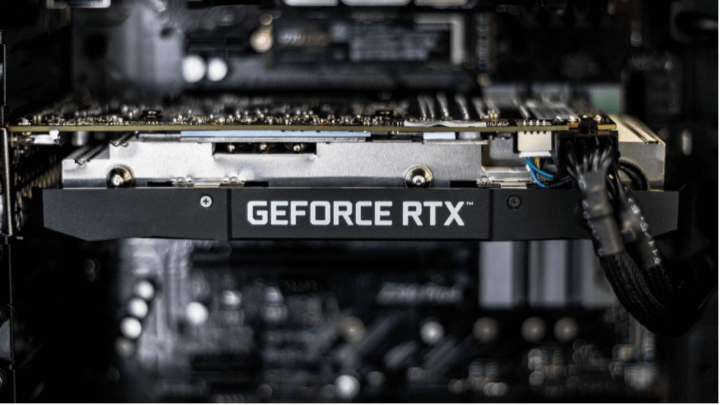
NVIDIA is also a pioneer in artificial intelligence, strongly focusing on generative AI. Here are some of its main generative AI models and products:
● GPUs for Deep Learning: NVIDIA offers a range of GPUs that enable fast and efficient training and inference of deep learning models, such as the GeForce RTX series, the Quadro RTX series, the Tesla V100 series, and the A100 series.
● GauGAN: a generative adversarial network (GAN) that can turn simple sketches into photorealistic images of natural scenes.
● PoE-GAN: a GAN that can generate portraits of people with different expressions, poses, and lighting conditions from a single image.
● StyleGAN: a GAN that can generate high-quality images of faces, cars, cats, bedrooms, and more with various styles and attributes.
NVIDIA Stock (NVDA) Trading Information
NVIDIA Corporation is on the NASDAQ stock exchange under the ticker symbol NVDA. The currency of the stock is US dollars (USD). The regular trading hours are from 9:30 a.m. to 4:00 p.m. Eastern Time (ET), Monday to Friday. The pre-market trading hours are from 4:00 a.m. to 9:30 a.m. ET and the after-market trading hours are from 4:00 p.m. to 8:00 p.m. ET.
NVIDIA Corporation got founded in 1993 and went public in 1999. Since then, it has issued four stock splits, the last being a 4-for-1 split in 2021. NVIDIA also pays quarterly dividends to its shareholders, the most recent being $0.16 per share in March 2021.
Some of the latest developments that investors and traders should note are:
● In January 2022, NVIDIA announced its acquisition of ARM, a leading semiconductor company, for $40 billion. The move faced regulatory scrutiny and was eventually terminated in February 2023.
● NVIDIA announced its financial results for the quarter that ended on January 29, 2023. It beat analysts’ expectations with revenue of $8.12 billion (up 6% year-over-year) and earnings per share of $2.45 (up 10% year-over-year). It achieved record revenue and profit in all of its segments, driven by its gaming and data center platforms, its GPU and AI solutions, and its acquisitions of Mellanox and Arm.
Meta Platforms Inc. (META) /Facebook
Meta Platforms Inc., formerly known as Facebook Inc., is an American multinational technology conglomerate based in Menlo Park, California. It is one of the leading companies in the field of generative AI, offering various products and services that leverage AI to create text, images, video, and data. Meta also owns Facebook, Instagram, WhatsApp, and other popular social media platforms. Some of Meta's main generative AI models and products are:

● VX2TEXT: a text generation system that can create natural language texts from visual inputs, such as images or videos.
● Make-A-Scene: a scene generation system that can create realistic and diverse 3D scenes from text descriptions or sketches.
● Make-A-Video: a video generation system that can create high-quality videos from text descriptions or images.
● Data2Vec: a data generation system that can create synthetic data sets for various domains and tasks.
Meta Stock (META) Trading Information
Meta Platforms Inc. is listed on the NASDAQ stock exchange under the META ticker. The currency of the stock is US dollars (USD). The regular trading hours are from 9:30 a.m. to 4:00 p.m. Eastern Time (ET), Monday to Friday. The pre-market trading hours are from 4:00 a.m. to 9:30 a.m. ET and the after-market trading hours are from 4:00 p.m. to 8:00 p.m. ET.
Meta Platforms Inc. was founded in 2004 and went public in 2012. Since then, it has issued no stock splits or dividends. In October 2021, it changed its name from Facebook Inc. to Meta Platforms Inc., reflecting its focus on building the metaverse.
Some of the latest developments that investors and traders should note are:
● In February 2022, Meta launched its Horizon Worlds platform, a social virtual reality experience where users can create and explore immersive worlds with others.
● In March 2023, Meta announced its Year of Efficiency, a plan to reduce its team size by around 10,000 people, cancel lower-priority projects, and improve its technology and financial performance.
● In April 2023, Meta reported strong Q1 earnings, beating analysts’ expectations with revenue of $34.7 billion (up 48% year-over-year) and earnings per share of $4.12 (up 93% year-over-year). The company also grew its user base to 2.1 billion daily and 3.5 billion monthly active users. Its advertising business and metaverse initiatives were the main drivers of its growth.
Alphabet Inc. (GOOGL, GOOG) /Google
Alphabet Inc. is an American multinational technology conglomerate holding company headquartered in Mountain View, California. It got created through a restructuring of Google in 2015 and became the parent company of Google and several former Google subsidiaries. Alphabet is one of the leading companies in generative AI, offering various products and services that leverage AI to create text, images, video, and data. Here are some of Alphabet's main generative AI models and products:
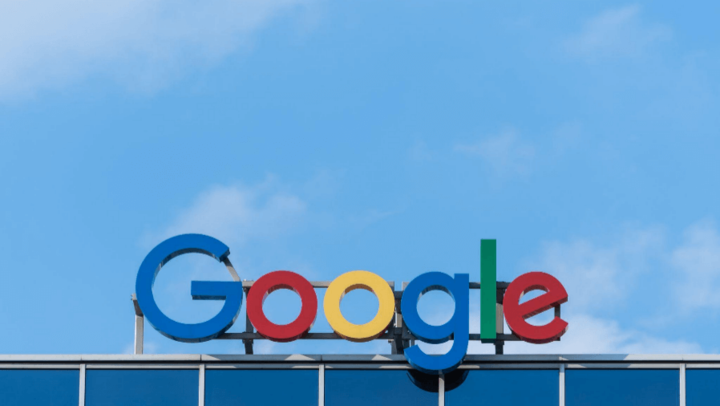
● Pathways Language Model (PaLM): a language model that can generate natural language texts for various tasks, such as summarization, question answering, and dialogue.
● Magenta: a research project that explores the role of machine learning in the process of creating art and music.
● NeRF: a neural radiance field that can generate photorealistic 3D scenes from 2D images.
● Phenaki: a video generation system that can create realistic and diverse videos of human actions from text descriptions.
Alphabet Stock (GOOGL, GOOG) Trading Information
Alphabet Inc. is listed on the NASDAQ stock exchange under the ticker symbol GOOGL for its Class A shares and GOOG for its Class C shares. The currency of the stock is US dollars (USD). The regular trading hours are from 9:30 a.m. to 4:00 p.m. Eastern Time (ET), Monday to Friday. The pre-market trading hours are from 4:00 a.m. to 9:30 a.m. ET and the after-market trading hours are from 4:00 p.m. to 8:00 p.m. ET.
Alphabet Inc. was founded in 2015 due to a corporate restructuring of Google, which was founded in 1998 and went public in 2004. Since then, it has issued no stock splits or dividends.
Some of the latest developments that investors and traders should note are:
● Alphabet reported strong 2023 Q1 earnings, beating analysts’ expectations with revenue of $66.4 billion (up 34% year-over-year) and earnings per share of $29.59 (up 166% year-over-year). The company also improved its operating margin to 30%, up from 19% a year ago. Its Google Cloud and YouTube segments were the main drivers of its growth, with revenue of $6.2 billion (up 46% year-over-year) and $9.5 billion (up 49% year-over-year) respectively.
● Alphabet faced some regulatory challenges, such as antitrust lawsuits from the U.S. Department of Justice and several states and a fine from France's competition authority for abusing its dominant position in online advertising.
Investment Opportunities of AI Stocks
AI stocks have high growth potential as AI is one of our most disruptive and transformative technologies. The global AI market had a value of $86.9 billion in 2022 and should grow at a compound annual growth rate (CAGR) of 36.2% in AI research and development, acquiring AI startups, and launching new AI products and services. Some of the factors driving this growth are the advances in cloud computing, big data, 5G, automation, and natural language processing.

The companies discussed above are developing cutting-edge AI solutions that can transform various industries such as healthcare, education, entertainment, and e-commerce. The demand for AI products and services is expected to increase exponentially in the future, as more businesses and consumers adopt AI-powered applications and devices.
How Product Updates Affect Stock Prices
Product updates can affect the stock price of AI companies and their peers by showing their innovation, competitiveness, and growth potential in AI. For example, OpenAI’s impact analysis on Microsoft, Google, and Nvidia boosted their stock prices, as did Microsoft’s announcement of offering Nvidia H100 systems on Azure. Google’s meeting with the White House on AI also lifted its stock price slightly. However, Meta’s rebranding and metaverse vision lowered its stock price, as investors doubted its viability and profitability.
Performance of AI Stocks in the Stock Market
According to Bank of America, AI stocks have outperformed the broader market by 9% annually since 2016. In 2021, AI stocks delivered an average return of 37%, compared to 29% for the S&P 500 index. In the first quarter of 2023, AI stocks soared after C3.ai, a leading provider of enterprise AI software, reported strong revenue growth and raised its full-year guidance. C3.ai’s shares jumped 24% on March 3, lifting other AI stocks such as Palantir Technologies, UiPath, and Snowflake. The average return of AI stocks in the first quarter of 2023 was 25%, compared to 8% for the S&P 500 index.

AI stocks have been outshining the S&P 500 index by 9% annually since 2016, with a record 37% return in 2021 and a 25% return in the first quarter of 2023, driven by C3.ai’s stellar earnings and guidance.
How to Invest in AI Stocks
There are three main ways to invest in AI stocks: holding the shares, buying options, or trading contracts for difference (CFDs). Here is a brief introduction and comparison of each way:
Holding the Shares
This means buying and owning the stocks of AI companies directly. You can benefit from dividends, stock splits, and capital appreciation. However, you also need to pay commissions, fees, and taxes, and you may face liquidity issues if the market is volatile or the stock is thinly traded.
Buying Options
This means buying contracts that give you the right to buy or sell a certain amount of AI stocks at a specified price and time. This way, you can leverage your investment and profit from both rising and falling markets. However, you also need to pay premiums, commissions, and fees, and you may lose your entire investment if the option expires worthless or out of money.
Trading CFDs
This means trading contracts that track the price movements of AI stocks without owning them. This way, you can use leverage, trade on margin, and profit from rising and falling markets. However, you also need to pay spreads, commissions, and overnight fees, and you may face margin calls if the market moves against you.
Why Trade AI Stocks CFD With VSTAR?
Among the three ways to invest in AI stocks, trading CFDs with VSTAR has several benefits:


● VSTAR offers competitive spreads, low commissions, and no hidden fees for trading AI stocks CFDs.
● VSTAR provides advanced trading platforms and tools that enable you to access real-time market data, execute orders quickly and accurately, and manage your risks effectively.
● VSTAR supports various payment methods and currencies for depositing and withdrawing funds from your trading account.
● VSTAR has a dedicated customer service team available 24/7 to assist you with any issues or queries regarding your trading experience.
Conclusion

In this article, we have explored the concept of generative AI and how it works. We have also introduced some popular generative AI products and models developed by five leading AI companies: Microsoft, Alphabet, NVIDIA, Meta, and Google. We have also discussed AI stocks' investment opportunities and performance in the stock market. Finally, we have explained investing in AI stocks using three methods: holding the shares, buying options, or trading CFDs with VSTAR. We hope this article has given you valuable insights and tips on benefiting from the AI revolution. If you get interested in trading AI stocks CFDs with VSTAR, sign up for a free demo account today and start your trading journey.







